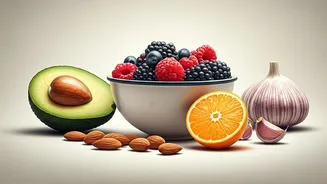Oats: The Powerhouse
Oats, a breakfast staple, are packed with soluble fiber, specifically beta-glucan. This fiber helps bind with cholesterol in the digestive system, preventing
its absorption into the bloodstream. Including oats in your diet can be a simple yet effective strategy to reduce LDL cholesterol, often referred to as 'bad' cholesterol. Aim for a daily serving of oats or oat-based foods, such as oatmeal or oat bran. The soluble fiber present in oats forms a gel-like substance that captures cholesterol, facilitating its elimination from the body. Starting your day with a bowl of oatmeal is not only nutritious but also heart-healthy, potentially lowering your risk of cardiovascular diseases.
Nuts: A Heart's Friend
Nuts, particularly almonds, walnuts, and cashews, are beneficial for heart health and also contribute to cholesterol management. These nuts are rich in unsaturated fatty acids, which can help lower LDL cholesterol levels. They also provide essential nutrients like fiber, vitamins, and minerals. Regular consumption of a handful of nuts daily can be a part of a heart-healthy diet. Opt for unsalted nuts to avoid excess sodium. The healthy fats found in nuts not only improve cholesterol profiles but also reduce inflammation and support overall cardiovascular function. Incorporating nuts into snacks, salads, or meals can boost your nutrient intake and promote better heart health.
Avocado: Creamy Goodness
Avocados, known for their creamy texture, are another excellent addition to a cholesterol-lowering diet. They are a significant source of monounsaturated fats, which help to reduce LDL cholesterol while increasing HDL cholesterol (the 'good' cholesterol). Including avocado in your diet can contribute to lower cholesterol levels and improve overall heart health. Consider adding avocado to salads, sandwiches, or smoothies. Avocados are also rich in antioxidants and fiber, both of which support a healthy heart. Their beneficial fats help improve blood lipid profiles. The versatile nature of avocados allows them to be incorporated into numerous dishes, making them a convenient and delicious way to support your cholesterol management goals.
Olive Oil: Liquid Gold
Olive oil, especially extra virgin olive oil, is a staple of the Mediterranean diet and is known for its heart-healthy properties. Rich in monounsaturated fats and antioxidants, olive oil helps lower LDL cholesterol and can protect against heart disease. Using olive oil in cooking and dressings provides a simple yet effective way to improve your cholesterol levels. Choose extra virgin olive oil for its higher nutrient content and health benefits. The antioxidants in olive oil help protect your heart from damage. Olive oil's role extends beyond its impact on cholesterol. The inclusion of olive oil in the diet can enhance overall cardiovascular well-being, contributing to a longer, healthier life.
Beans and Legumes
Beans and legumes, like lentils, chickpeas, and kidney beans, are packed with soluble fiber, a key element in lowering cholesterol. This fiber binds with cholesterol in the digestive system, reducing its absorption. Incorporating beans and legumes into your diet is a simple and cost-effective way to improve your cholesterol profile and overall health. Add them to soups, salads, or stews. Regular consumption of beans and legumes can significantly impact LDL cholesterol levels. The fiber-rich nature of these foods not only helps manage cholesterol but also contributes to better digestion and overall well-being. Using these in your diet contributes to both heart health and sustainable eating habits.













